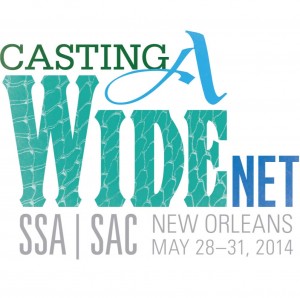
The offices at the University of Houston Special Collections are a little quieter than usual today as some of our faculty are on the road, attending the Society of Southwest Archivists annual conference being held in New Orleans, Louisiana. The SSA, a professional organization serving hundreds of archivists, librarians, preservationists and the like, has met annually in one of the six member states since the early 1970s to build relationships among the various organizations and institutions committed to documenting our history, establish standards and principles to help guide processes, and provide education and training to its members.
As the conference has grown to encompass more days, more sessions, and more pre-conference workshops, the meat of the meeting remains today and tomorrow. With an overarching theme of “Casting a Wide Net: Broadening the Archival Experience,” panelists will present sessions covering topics like creative strategies to connect archives to underserved populations, ways to better facilitate the undergraduate experience in special collections, as well as boot camps for archivists to help with some of the other day-to-day challenges they face.
Our own Stacey Lavender, Houston Arts and History Archives Fellow, will lead a session with two other colleagues entitled, “Archival Adaptation: Responsive Approaches to Standards-Based Processing,” where she will present her paper, “Less Process, More Problems: An Adaptive Approach to Implementing MPLP.”
For those not so well-versed in the archival alphabet soup of acronyms, MPLP or “More Product, Less Process” is shorthand for an approach to the cataloging and processing challenges resulting from an increase in the acquisition of collections and sheer volume of collections in our information age, coupled with stagnant or reduced staffing levels in many archives. MPLP’s modest proposal is an attempt at “pragmatically revamping traditional processing approaches to deal with late 20th-century collections,” and, in the process, provide increased access to researchers while decreasing the number of collections in the queues of various archives. In her paper, Ms. Lavender reports on the specifics of her hands-on experience in the MPLP schema, processing collections like the Main Street Theater Records, the DJ Steve Fournier Papers, and the Carlos “DJ Styles” Garza Papers at the University of Houston.
To all the archivists in New Orleans this weekend, a tip of our hats, a hearty “thank you” for preserving our narrative, and here’s wishing you all safe passage as you head home.
